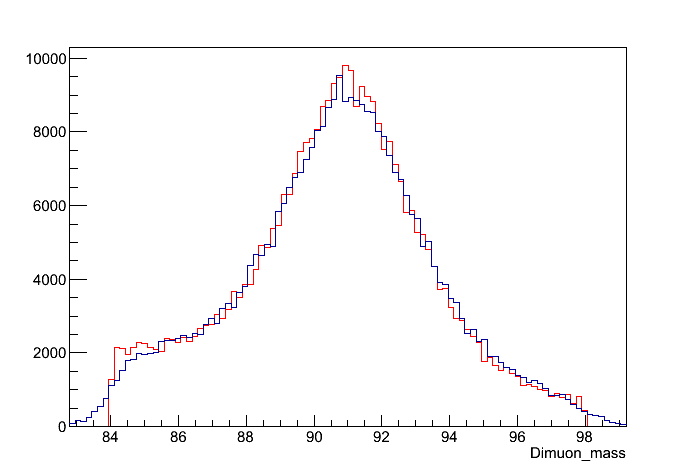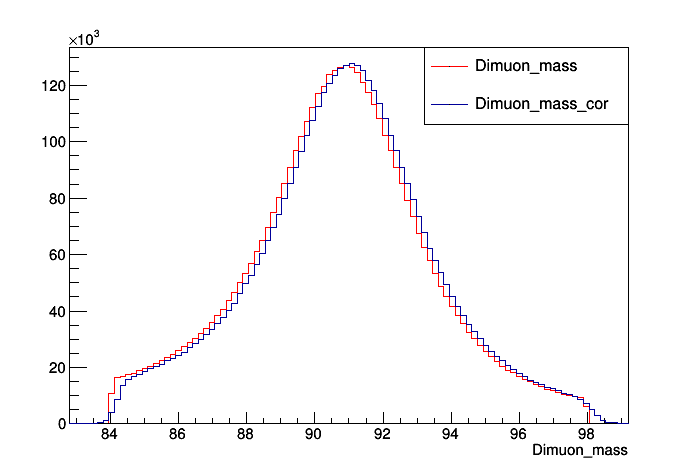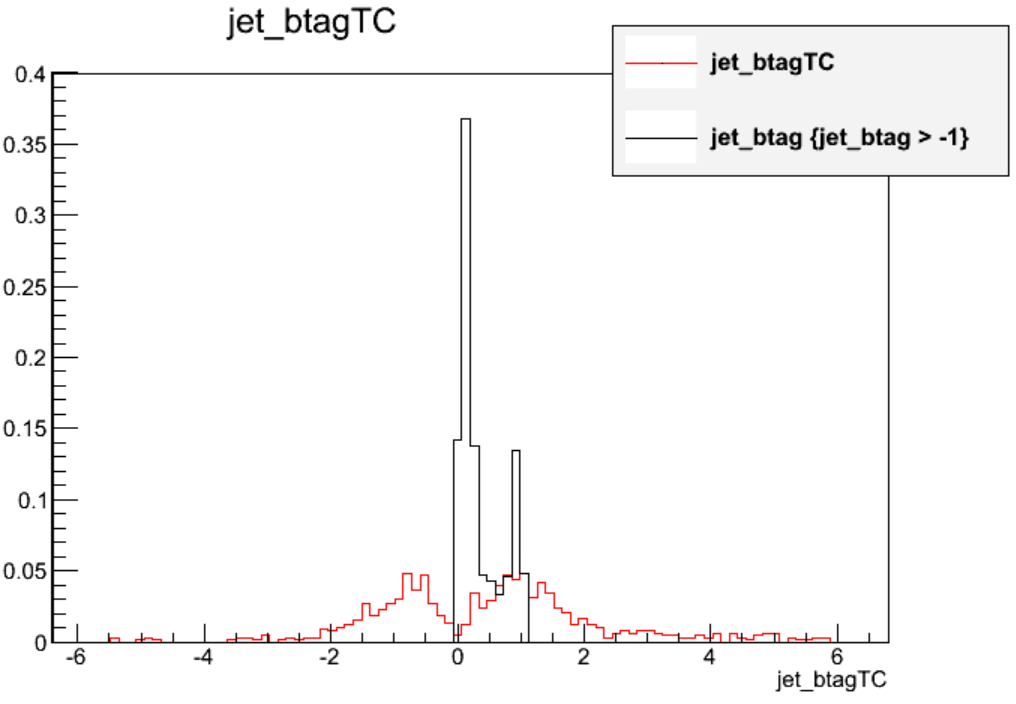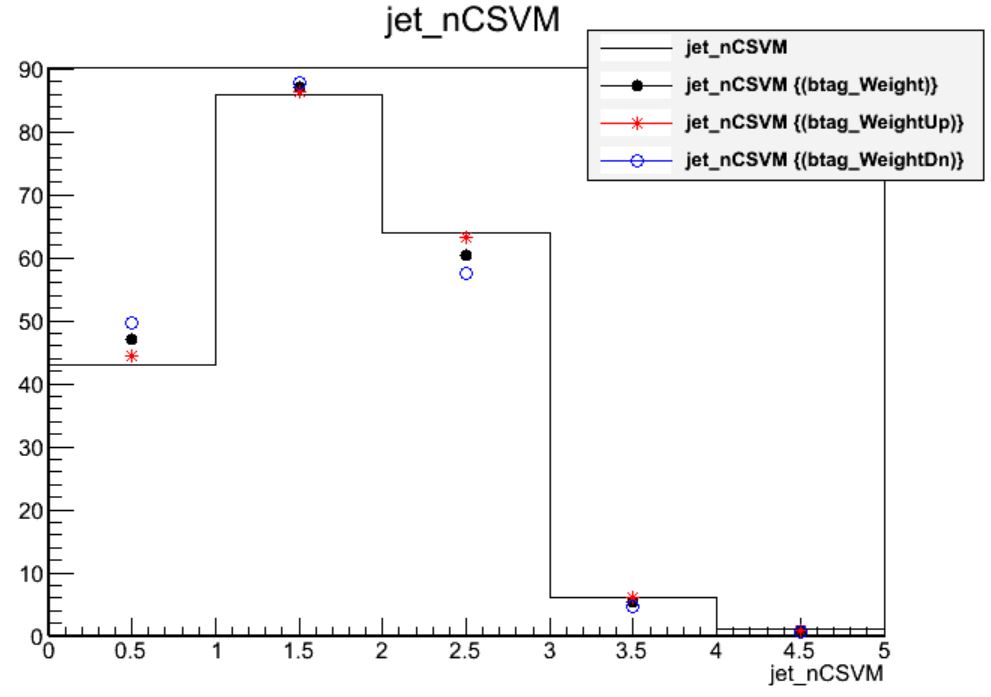Advanced objects hands-on
Overview
Teaching: 0 min
Exercises: 40 minQuestions
How can I visualize the effect of the muon corrections?
How do I access other b tagging discriminators?
How do I apply the b tagging scale factors and visualize the uncertainty?
Objectives
Practice plotting histograms in ROOT to view POET histograms.
Implement multiple b taggers and count the number of b-tagged jets
Apply the central and shifted b tagging scale factors
Choose your exercise! Complete exercise #1 on the muon corrections, and then choose one of the options for exercise #2 on b-tagging.
Exercise 1: results of the muon correction
Check that the corrections have been applied correctly by plotting the corrected and uncorrected invariant mass of μ+μ- on the ROOT command line. If everything went right with the corrections, there should be a difference in the invariant masses. Cut the x-axis to be from 84 to 98.
Hint: You can find the branch names of the invariant masses from Analysis.C.
Solution
$ root RochesterCorrections/Test/ZZTo2e2mu_Cor.root [0] Events->Draw("Dimuon_mass", "Dimuon_mass > 84 && Dimuon_mass < 98") [1] Events->Draw("Dimuon_mass_cor", "Dimuon_mass > 84 && Dimuon_mass < 98", "hist same"); htemp->SetLineColor(2);You should get something like this:
An example of what the plot looks like for data:
Exercise 2 option A: alternate b taggers
The statements printed from
addJetCollectionwhen runningpoet_cfg.pyshows the options for strings that can be used in thebdiscriminator()function:The bdiscriminators below will be written to the jet collection in the PATtuple (default is all, see PatAlgos/PhysicsTools/python/tools/jetTools.py) jetBProbabilityBJetTags jetProbabilityBJetTags trackCountingHighPurBJetTags trackCountingHighEffBJetTags simpleSecondaryVertexHighEffBJetTags simpleSecondaryVertexHighPurBJetTags combinedSecondaryVertexBJetTagsAdd 1-2 new branches for alternate taggers and compare those discriminants to CSV.
After editing
PatJetAnalyzer.cc,$ scram b $ cmsRun python/poet_cfg.py False True $ root -l myoutput.root [0] TBrowser bSolution
Let’s add the high purity track counting tagger, which was the most common tagger in 2011. After adding a new array declaration and branch in the top sections of
PatJetAnalyzer.cc, we can callbDiscriminator()for these alternate tagger:// Declarations std::vector<double> jet_btag; std::vector<double> jet_btagTC; // Branches mtree->Branch("jet_btag",&jet_btag); mtree->Branch("jet_btagTC",&jet_btagTC); // inside the jet loop jet_btag.push_back(itjet->bDiscriminator("combinedSecondaryVertexBJetTags")); jet_btag.push_back(itjet->bDiscriminator("trackCountingHighPurBJetTags"));The distributions in ttbar events (excluding events with null values) look remarkably different! The CSV algorithm is a typical “multivariate” discriminant that ranges from 0 to 1 while the track counting discriminant represents a physics-based impact parameter quantity that has a much wider range of values. More information about the various taggers can be found here.
Exercise 2 option B: count medium CSV b tags
Calculate the number of jets per event that are b tagged according to the medium working point of the CSV algorithm. Store a branch called
jet_nCSVMand draw it 3 times, applying the scale factor weights and demonstrating the uncertainty.After editing
PatJetAnalyzer.cc,$ scram b $ cmsRun python/poet_cfg.py False True $ root -l myoutput.root [0] _file0->cd("myjets") [1] Events->Draw("jet_nCSVM","(btagWeight)") [2] Events->Draw("jet_nCSVM","(btagWeightUp)","p hist same") [3] Events->Draw("jet_nCSVM","(btagWeightDown)","p hist same")Solution
We count the number of “Medium CSV” b-tagged jets by summing up the number of jets with discriminant values greater than 0.679. After adding a variable declaration and branch we can sum up the counter:
int jet_nCSVM = 0; for (std::vector<pat::Jet>::const_iterator itjet=myjets->begin(); itjet!=myjets->end(); ++itjet){ // ... JEC uncert, JER, storing variables... jet_btag.push_back(itjet->bDiscriminator("combinedSecondaryVertexBJetTags")); if (itjet->bDiscriminator("combinedSecondaryVertexBJetTags") > 0.679) jet_nCSVM++; }Applying the scale factor weight shifts the mean of the distribution down slightly. The uncertainty wraps around the central distribution with a magnitude of approximately 6% in this sample.
Key Points
Muon corrections are a precision adjustment to a dimuon mass histogram.
B tagging scale factors and uncertainties should be considered for any distribution that relies on b-tagged jets



